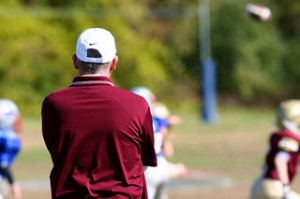Youth Sport Coaches Want These Habits
By Jim Herrick
Do you want to make the team, get more playing time, or win a championship this season? If you do, stop worrying about ability and start focusing on habit building.
Athletic Revolution coaches around the country work hard to instill Champion habits into all the kids who work with us, whether they play sports or not. We do this because we see how important they are to a young athlete’s long-term success on the field, in the classroom, and in life.
Kids who focus on winning or other external goals often lose sight of the internal factors that in many cases lead to much more personal and team success in the long run.
For anyone going out for a team, remember that by developing these 5 critical habits you will help yourself to get noticed by youth sport coaches, contribute more to your team, and become the best player you can possibly be over time.
Attention to detail: There are so many small details that go into the successful execution of a play or game plan. Players who do the little things that most kids overlook send a message to their coach that they are the detail-oriented type that helps teams become more successful. Building this habit during your youth league experiences will make it far easier to succeed as you move through high school and beyond, where sport has just as much to do with execution as it does ability.
Focus: Youth sport coaches never have enough practice time to do all the things they’d like to in order to prepare their teams. Players that are focused and attentive help to keep things moving along positively in practices, helping the team as a whole to get more done. And since the habits we all build in practices or training carry over to game performance, improving your focus will help you deal with adversity from opponents, crowds and other distractions that come up during the heat of competition.
Passion: Nothing is more infectious than enthusiasm. If you live to play your sport and can’t get enough of it, let it come out! Show energy and excitement at appropriate times. Give 100% in everything you do, from the simplest drill to the toughest physical challenge. Project a feeling of excitement on a regular basis, and your youth sport coaches will surely take notice.
Leadership: You do not have to be the star of your team to be a leader. Leadership is about helping to do what is best for the group as a whole, especially at times when it is not easy to do so. When it’s needed, pick up a teammate who is struggling. Let your passion show when the team appears flat. In critical moments where your group needs a leader, step up and be the voice that moves everyone in a better direction.
Show Improvement Over Time/Perseverance: The gains you make over the course of a season are a byproduct of your focus, passion, and attention to detail. I mention it separately because it is possible your coaches may not immediately realize the value of all the little things you bring to the table. But with the right habits in place, over time you’re going to get significantly better. And when that happens, I can almost guarantee your youth sport coaches will see it.
If you are not getting the playing time or having the team success you wished for right away, hang in there. Keep training and practicing with passion, stay focused and do all the little things you’ll need for success. Often times it takes longer to reach your goals than you realize. The true achievers in this world are those that hang in there and fight through the struggles while continuing to build great habits.
Many young athletes simply want to win as many youth sport coaches know, but are either unsure or unwilling to focus on all the critical steps that lead to long-term success. A true Champion recognizes that those who come out on top in the end put in countless hours of focused practice, took hundreds or thousands of small steps forward along the way, and continued to stay energized despite the roadblocks that fell on their path.
